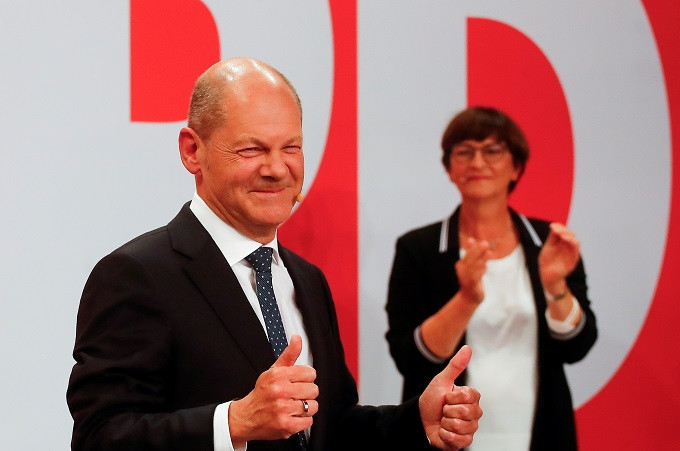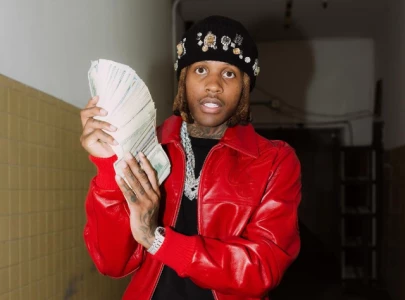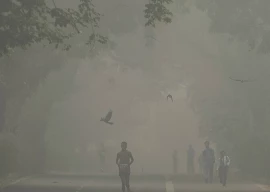
Germany's Social Democrats were set on Monday to start the process of trying to form a government after they narrowly won their first national election since 2005 to end 16 years of conservative-led rule under Angela Merkel.
The centre-left Social Democrats (SPD) won 25.7% of the vote, ahead of 24.1% for Merkel's CDU/CSU conservative bloc, according to provisional results. The Greens came in at 14.8% and the liberal Free Democrats (FDP) were on 11.5%.
The SPD's recovery marks a tentative revival for centre-left parties in parts of Europe, following the election of Democrat Joe Biden as U.S. president in 2020. Norway's centre-left opposition party also won an election earlier this month.
The Social Democrats' chancellor candidate, Olaf Scholz said he hoped to strike a coalition deal before Christmas, although his Christian Democrat rival Armin Laschet, 60, said he could still try to form a government despite leading the conservatives to their worst ever election result.
Read After historic floods, Germany grapples with mountains of debris
Merkel will stay in charge in a caretaker role during the coalition negotiations that will set the future course of Europe's largest economy.
German shares (.GDAXI) opened 1.1% higher on Monday, with investors pleased that the pro-business FDP looked likely to join the next government while the far-left Linke failed to win enough votes to be considered as a coalition partner.
"From a market perspective, it should be good news that a left-wing coalition is mathematically impossible," said Jens-Oliver Niklasch, LBBW economist.
He said other parties had enough in common to find a working compromise.
"Personalities and ministerial positions will probably be more important in the end than policies."
WHO WILL BE CHANCELLOR?
The parties will start sounding each other out on Monday about possible alliances in informal discussions.
The SPD is likely to seek an alliance with the Greens and the FDP to secure parliamentary majority, although the two parties could also team up with the conservatives.
SDP General Secretary Lars Klingbeil told ARD television, the party would fight to ensure Scholz becomes the next chancellor. "We won the election," he said.
The SPD will talk to the Greens and the FDP about forming the next government, Klingeil said, adding that party leadership was set to meet on Monday to discuss the next steps.
The Greens and FDP said last night, however, they would first talk to each other to sound out areas of compromise before starting negotiations with either the SPD and CDU.
If Scholz, 63, succeeds in forming a coalition, the finance minister in Merkel's cabinet and former mayor of Hamburg would become the fourth post-war SPD chancellor.
Paul Ziemiak, general secretary of Merkel's Christian Democrats, said there was still a chance for his party's alliance with the Greens and FDP, adding that Laschet knew how to keep coalitions together.
COALITION FOR CHRISTMAS?
Merkel has stood large on the European stage almost since taking office in 2005 - when George W. Bush was US president, Jacques Chirac in the Elysee Palace in Paris and Tony Blair British prime minister.
But Berlin's allies in Europe and beyond will probably have to wait for months before they can see how the new German government will engage on foreign issues.
Assuming the SPD agree a deal with the Greens and the FDP, the Greens could provide the foreign minister, as they did with Joschka Fischer in their previous two-way alliance with the SPD, while the FDP is seeking the finance ministry.
A row between Washington and Paris over a deal for Australia to buy US instead of French submarines has put Germany in an awkward spot between allies, but also gives Berlin the chance to help heal relations and rethink their common stance on China.
On economic policy, French President Emmanuel Macron is eager to forge a common European fiscal policy, which the Greens support but the CDU/CSU and FDP reject. The Greens also want "a massive expansion offensive for renewables".
One thing is certain: the future government will not include the far-right Alternative for Germany (AfD) which scored 10.3%, a fall from four years ago when they stormed into the national parliament with 12.6% of the vote. All mainstream politicians rule out a coalition with the party.



















COMMENTS
Comments are moderated and generally will be posted if they are on-topic and not abusive.
For more information, please see our Comments FAQ